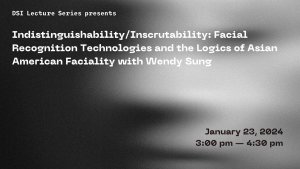Presented By: Digital Studies Institute
DSI Lecture Series | Indistinguishability/Inscrutability: Facial Recognition Technologies and the Logics of Asian American Faciality
Wendy Sung

The mug shot and modes of phrenological and photographic comparison to legitimate eugenics-based categorization have long been acknowledged as precursors to modern facial recognition technologies. However, this talk traces a pre-history of these technologies to different biometric past: the rise of immigration identification papers within the US when the Chinese Exclusion laws marked the formal emergence of visual documentation regulation into immigration policy. Bringing this history to bear on the present, this talk illuminates how our contemporary moment of facial attunement normalizes a forensic investigatory eye when it comes to facial logics, one that is indebted to the specificity of the Asian face. I argue that the ways the Chinese seeking entry into the US relied on the very mechanisms of racialized non-recognition— indistinguishability and inscrutability— to bypass exclusion through paper son forgeries constitute foundational logics of facial recognition technologies. Examining two examples of Asian faciality, reconstructions of the George Floyd murder and performance artist and photographer Tommy Kha’s work, this talk elucidates that the hyperscrutiny paid to the Asian face and its misrecognitions are not the glitches in facial recognition but are, in fact, central features.
Professor Wendy Sung is assistant professor of race, media, and digital culture in the Department of World Arts and Cultures/Dance. An interdisciplinary scholar and educator trained in critical ethnic studies, digital and media studies, and American studies, her work sits at the intersection of comparative histories of racialization in the U.S., transmedia histories and digital culture, and the dynamics of visuality and cultural memory. Her research and teaching are animated by two questions: how do media and digital technology instantiate new relationships of racialization, visuality, and knowledge? And conversely, how do racialized subjects innovate, concretize, or challenge paradigms of the technological? She asks these questions to not only reconstruct racial histories of digital technologies in the longue durée, but also to critically examine historical claims about the distinctiveness of modern digital practices and epistemologies. Informed by feminist and critical race studies, Sung has examined varied visual media such as street art, reality television, Twitter, chatbot technologies, and biometrics, to name a few.
Her first book project, Violent Virality: Racial Violence and the Making of New Media examines the relationships between race, technology, and media cultures through the phenomenon of watching racial violence in 20th and 21st century American culture. She is also at work on a second book project tentatively titled, Faciality/Raciality: The Asian Face as Technological Object, which examines the ways that the Asian face, in its racialized logics of non-recognition—indistinguishability and inscrutability— functions as an unacknowledged foundational subject for facial recognition technologies.
This will be a hybrid event, with options for both in-person and virtual attendance.
Register here for virtual attendance: https://bit.ly/3sBoiay
Register here for in-person attendance: https://myumi.ch/73xq1
CART will be provided. If you anticipate needing accommodations to participate, please email Eric Mancini at dsi-administration@umich.edu. Please note that some accommodations must be arranged in advance and we encourage you to contact us as soon as possible.
We would like to thank the following Department Co-Sponsors:
Department of Communication and Media
Department of American Culture
Department of Film, Television, and Media
Center for Ethics, Society, and Computing
Professor Wendy Sung is assistant professor of race, media, and digital culture in the Department of World Arts and Cultures/Dance. An interdisciplinary scholar and educator trained in critical ethnic studies, digital and media studies, and American studies, her work sits at the intersection of comparative histories of racialization in the U.S., transmedia histories and digital culture, and the dynamics of visuality and cultural memory. Her research and teaching are animated by two questions: how do media and digital technology instantiate new relationships of racialization, visuality, and knowledge? And conversely, how do racialized subjects innovate, concretize, or challenge paradigms of the technological? She asks these questions to not only reconstruct racial histories of digital technologies in the longue durée, but also to critically examine historical claims about the distinctiveness of modern digital practices and epistemologies. Informed by feminist and critical race studies, Sung has examined varied visual media such as street art, reality television, Twitter, chatbot technologies, and biometrics, to name a few.
Her first book project, Violent Virality: Racial Violence and the Making of New Media examines the relationships between race, technology, and media cultures through the phenomenon of watching racial violence in 20th and 21st century American culture. She is also at work on a second book project tentatively titled, Faciality/Raciality: The Asian Face as Technological Object, which examines the ways that the Asian face, in its racialized logics of non-recognition—indistinguishability and inscrutability— functions as an unacknowledged foundational subject for facial recognition technologies.
This will be a hybrid event, with options for both in-person and virtual attendance.
Register here for virtual attendance: https://bit.ly/3sBoiay
Register here for in-person attendance: https://myumi.ch/73xq1
CART will be provided. If you anticipate needing accommodations to participate, please email Eric Mancini at dsi-administration@umich.edu. Please note that some accommodations must be arranged in advance and we encourage you to contact us as soon as possible.
We would like to thank the following Department Co-Sponsors:
Department of Communication and Media
Department of American Culture
Department of Film, Television, and Media
Center for Ethics, Society, and Computing